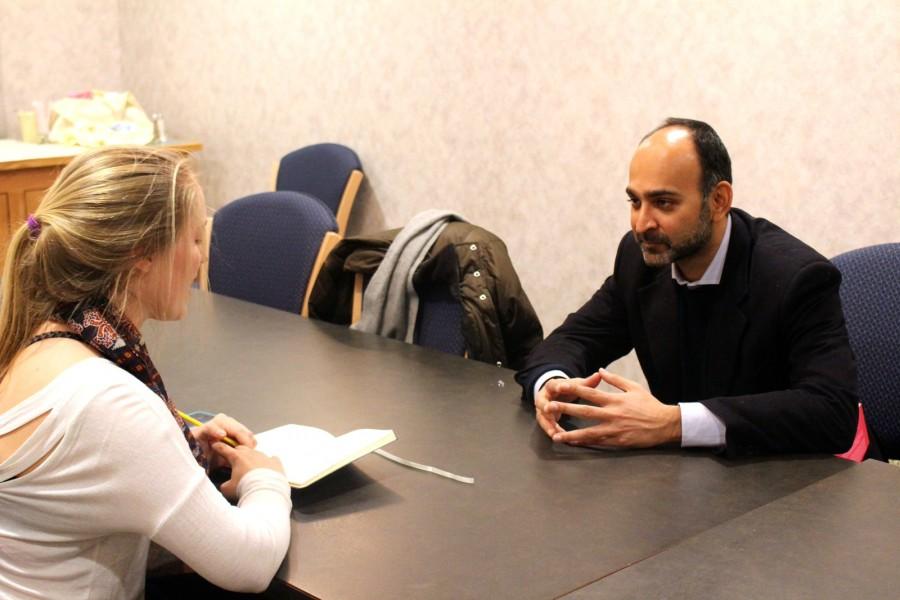‘We are all migrants:’ Mohsin Hamid shares insight on novel
February 26, 2015
Acclaimed novelist Mohsin Hamid brought first-years’ required reading to life when he spoke about his book “The Reluctant Fundamentalist” on Feb. 24. The novel was chosen as part of the First-year Common Reading Series by a number of faculty, students, and staff who comprise the First-year Reading Committee. The final choice was made by Provost Mick Smyer, and coordinated by Director of New Student Orientation & Student Leadership Programs Beth Bouchard, along with Assistant Director of the Teaching & Learning Center Brian Gockley.
“The Reluctant Fundamentalist” revolves around the dueling perspectives and ambitions of a young Pakistani man who lives as one of Manhattan’s elite before, during, and after the Sept. 11 terrorist attacks. It has achieved the No. 4 ranking on the New York Times Best Seller list, and has won numerous literary awards worldwide.
Hamid has spoken at dozens of universities.
“It is very interesting to come to different places because you think you are watching me speak, but really, it is me watching you and making observations,” Hamid said.
During his talk, Hamid discussed growing up with the dual identities associated with living in two different countries during the self-development period that is youth.
“I have this notion which I believe in very deeply,” Hamid said, “that we are all migrants, whether geographically or by our age, gender, sexuality, race, ethnicity–if we can regard one every other human as a migrant, we may be able to recognize one another as more than we appear to be. This, I think, will lead to greater humanity in all of us.”
Hamid also addressed the concept of the “Bucknell Bubble,” which his attention was brought to during his visit. He refuted the common belief held on campus that the student population sometimes lacks diversity and speculation about the world outside the “Bubble,” instead saying, “I think that a community like Bucknell isn’t lacking in diversity, actually. Beneath the surface there is a lot of diversity. But the danger is, when that diversity is hidden, or when you think it is hidden, you feel less comfortable expressing your own diversity.”
“The committee felt strongly that the book selected for the Class of 2018 should require our newest community members to consider the world from the vantage point of someone whose worldview may differ distinctly from their own,” Bouchard said, referring to the selection of the First-year Common Reading.
This is the first fictional book chosen as the First-year Common Reading, and the response was “overwhelmingly positive,” Bouchard said, “[because] students, faculty, and staff were drawn into the story and challenged by both the conclusions and ambiguity presented … The lack of a clear conclusion was a very positive challenge to all of us–we were required to formulate our own ending and reflect on why that resolution was what we expected.”
“The Reluctant Fundamentalist” is written in a frame-style, where there is a sometimes fragmented and one-sided narrative that draws attention to the potential unreliability of the narrator.
“It is a sort of a parallel to how the global news media acts … we tend to only give one side of the story a voice,” Hamid said.
Hamid employed this technique to make the reader fill in the blanks about what the story was saying in order to force realizations about the reader’s perspective and preconceived notions.
“I am trying to build a bare, sparse room, into which you walk. After you walk into it, you then decide what happens, based on your own experiences and ideas. I like the idea of the reader having agency within the book–this is why I like ambiguity,” Hamid said.
Two of Hamid’s most influential mentors during his time at Princeton University were acclaimed writers and poets Joyce Carol Oates and Toni Morrison. Coincidentally, both were honored in the last 10 years at the University for the Janet Weis Fellow in Contemporary Letters award. Upon learning this, Hamid was delighted.
“Professors like that are really important because as an undergraduate student, you don’t know you are allowed to have these dreams [of writing for a living],” Hamid said.
Hamid answered questions after his talk, most hinging around the ideas of ambiguity in the story, as well as his take on competing identities within the book and his own life. He spoke specifically on the tension-charged aspects of East-West dynamics that characterize his book, and how dueling identities have become more prevalent in recent years.
In reference to terrorist attacks such as the bombing of the London transportation system in the 2000s, which were committed by British Asians (rather than a radicalized religious group with one identity), Hamid said, “What is it about these mixed-experience hybridizations that lead to these horrific events? I think it has something to do with wanting to eradicate that part of you. People need to be less afraid of being ‘mixed,’ and fiction allows you to embrace that experience of being someone other than yourself.”
Perhaps Hamid’s personal achievements are even more impressive than those of “The Reluctant Fundamentalist,” as highlighted by Smyer in his introductory words. They range from graduating from Princeton University and Harvard Law School (having submitted his first novel, “Moth Smoke,” as his Juris Doctor thesis), to appearing in innumerable global publications such as TIME, The Guardian, and The Paris Review, and being named in 2013 as one of Foreign Policy magazine’s 100 Leading Global Thinkers.
“Listening to Mr. Hamid speak was a truly enriching experience. His unique perspectives on what it means to be ‘foreign’ broadened my scope of thinking,” Julia Lasko ’17 said.






















